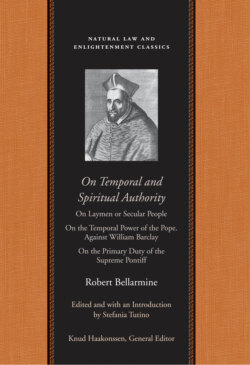Читать книгу On Temporal and Spiritual Authority - Robert Bellarmine - Страница 31
На сайте Литреса книга снята с продажи.
CHAPTER 17 It does not pertain to the magistrate to judge in matters of religion
ОглавлениеThe fifth question follows, concerning the duty of the political magistrate in the cause of religion. In this regard there are three errors. The first is the error of those who attribute too much to the magistrates, such as Brenz in Prolegomena; Melanchthon in Loci, chapter on the magistrate; and others, who want kings to be not only the protectors and defenders of religion, but also its judges and teachers. For they say that to judge controversies of faith, to preside over general councils, to appoint ministers and pastors, and to carry out other similar duties pertain to kings as chief members of the Church. We discussed this error a great deal in the Controversiae, on the judge of controversies, the Supreme Pontiff, and the councils, where we showed that kings have the first place among Christians as Christian men, that is, as citizens of the earthly city, but not as fellow citizens among the saints and servants of God, nor as members of the Church. For in this last respect the bishops have the first place, and the chief is the Supreme Pontiff, second the priests, third the deacons and the other ecclesiastical ministers, and last the laymen, among whom also kings and princes are numbered.
Hence when Chrysostom addresses the deacons in his homily 83 on Matthew, he says: “If any commander, the consul himself, he who is adorned with the crown, acts impiously, repress and punish him, for you have a greater authority than he.” And Gelasius in his epistle to Emperor Anastasius says: “O my most loving son, know that even if you preside over humankind because of your excellence in earthly matters, nevertheless you lower your head devoutly in front of those who preside over divine matters and from them you await the source of your salvation, and when receiving the heavenly sacraments from those to whom this pertains, know that you must submit to, rather than command, the religious hierarchy. Know therefore that in these matters you depend on their judgment, and they cannot be reduced to your will.”161
Finally, Christ committed the task of governing the Church to Peter and the bishops, not to Tiberius and his prefects, and for three hundred years the Church was governed most successfully by bishops and prelates alone, without any Christian king, except for a very few who either ruled for a very short time, as Philippus Caesar, or ruled only in a certain province, as Lucius king of the Britons. See more in the already mentioned passages.
